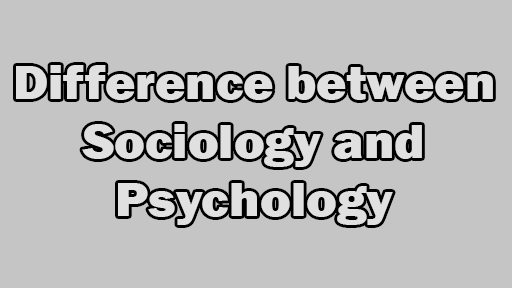Difference between Sociology and Psychology:
Sociology and psychology are two distinct yet interconnected disciplines that delve into the intricate aspects of human behavior and societal structures. While both fields share the overarching goal of understanding human nature, they approach this task from different perspectives. Here is the key difference between sociology and psychology.
| Aspect | Sociology | Psychology |
| Scope | Sociology primarily focuses on the study of society, its institutions, and group dynamics. It seeks to understand how social structures influence human behavior and shape interactions on a collective level. | Psychology concentrates on individual behavior, thoughts, and emotions. It delves into the internal processes of the mind, exploring cognitive functions, emotions, and behaviors at the personal level. |
| Unit of Analysis | Sociology often analyzes groups, communities, and societies as a whole. It looks at patterns and trends that emerge on a larger societal scale, emphasizing the interconnectedness of social elements. | Psychology focuses on the individual as the primary unit of analysis. It investigates the unique psychological processes, experiences, and behaviors of individuals, recognizing and studying variations between people. |
| Methods | Sociological research often employs qualitative methods such as interviews, observations, and case studies. These methods allow researchers to capture the depth and complexity of human experiences within a social context. | Psychology commonly uses quantitative methods, including experiments, surveys, and statistical analyses. This approach aims to gather data on measurable variables, facilitating the identification of patterns and general principles governing human behavior. |
| Focus on Culture | Sociology places a significant emphasis on cultural aspects, examining how shared beliefs, values, and norms shape society. It explores the ways in which culture influences social structures and interactions. | Psychology acknowledges the influence of culture but tends to prioritize the study of individual differences and universals in human behavior. Cultural psychology within the field does explore how culture shapes individual experiences and behaviors. |
| Nature vs. Nurture | Sociologists often emphasize the impact of external factors, such as socialization and environment, in shaping behavior. They investigate how societal influences mold individuals and contribute to the development of norms and values. | Psychologists explore the interplay between genetic and environmental influences on behavior. This nature vs. nurture debate is a central theme in psychology, recognizing both biological and environmental factors in shaping an individual’s characteristics and behaviors. |
| Time Perspective | Sociology often takes a historical perspective, analyzing societal changes over time and examining long-term trends. It seeks to understand how social structures evolve and impact human behavior across different historical periods. | Psychology may focus on the immediate and short-term factors influencing individual behavior. Clinical psychology, for example, often addresses present challenges and mental health concerns. However, developmental psychology considers changes over an individual’s lifespan. |
| Applications | Sociological insights find applications in areas like social policy, community development, and organizational management. Sociologists contribute to addressing societal issues and shaping policies informed by an understanding of social structures. | Psychology is applied in various settings, including clinical practice, education, counseling, and industries. Psychologists work to understand and address individual mental health, behavior, and cognitive processes, contributing to personal development and well-being. |
| Holistic vs. Reductionist Approach | Sociology tends to adopt a holistic approach, considering the interconnectedness of various social elements. It looks at the entirety of social systems, recognizing that each part contributes to the functioning of the whole. | Psychology, especially in experimental settings, may adopt a reductionist approach. This involves breaking down complex psychological phenomena into simpler components for analysis, helping to identify specific factors influencing behavior. |
| Theoretical Frameworks | Sociological theories, such as functionalism, conflict theory, and symbolic interactionism, provide overarching frameworks for understanding society. These theories offer perspectives on how social structures operate and how individuals interact within them. | Psychological theories, such as behaviorism, psychoanalysis, and cognitive psychology, provide insights into individual behavior and mental processes. These theories help explain the psychological mechanisms that underlie various aspects of human cognition and behavior. |
| Interdisciplinary Connections | While both disciplines are distinct, there is an increasing recognition of their interdependence. Fields like social psychology and cultural psychology serve as bridges between sociology and psychology, fostering a more comprehensive understanding of human behavior. | Interdisciplinary connections between sociology and psychology continue to grow. Collaborations in areas such as social neuroscience and health psychology illustrate the benefits of combining insights from both disciplines to gain a deeper understanding of the complexities of human behavior. |
In conclusion, sociology and psychology, though distinct, contribute complementary perspectives to our understanding of human behavior and societal structures. The differences outlined in this article showcase the diversity within the social sciences, highlighting the richness that arises from studying human nature from various angles. As these disciplines continue to evolve, interdisciplinary collaboration may lead to even greater insights into the complexities of human existence.

Library Lecturer at Nurul Amin Degree College










